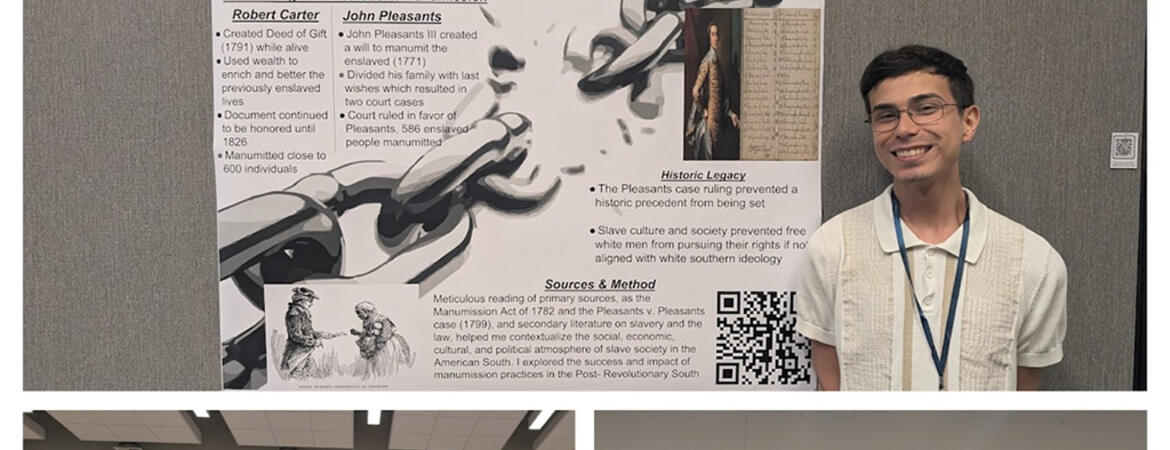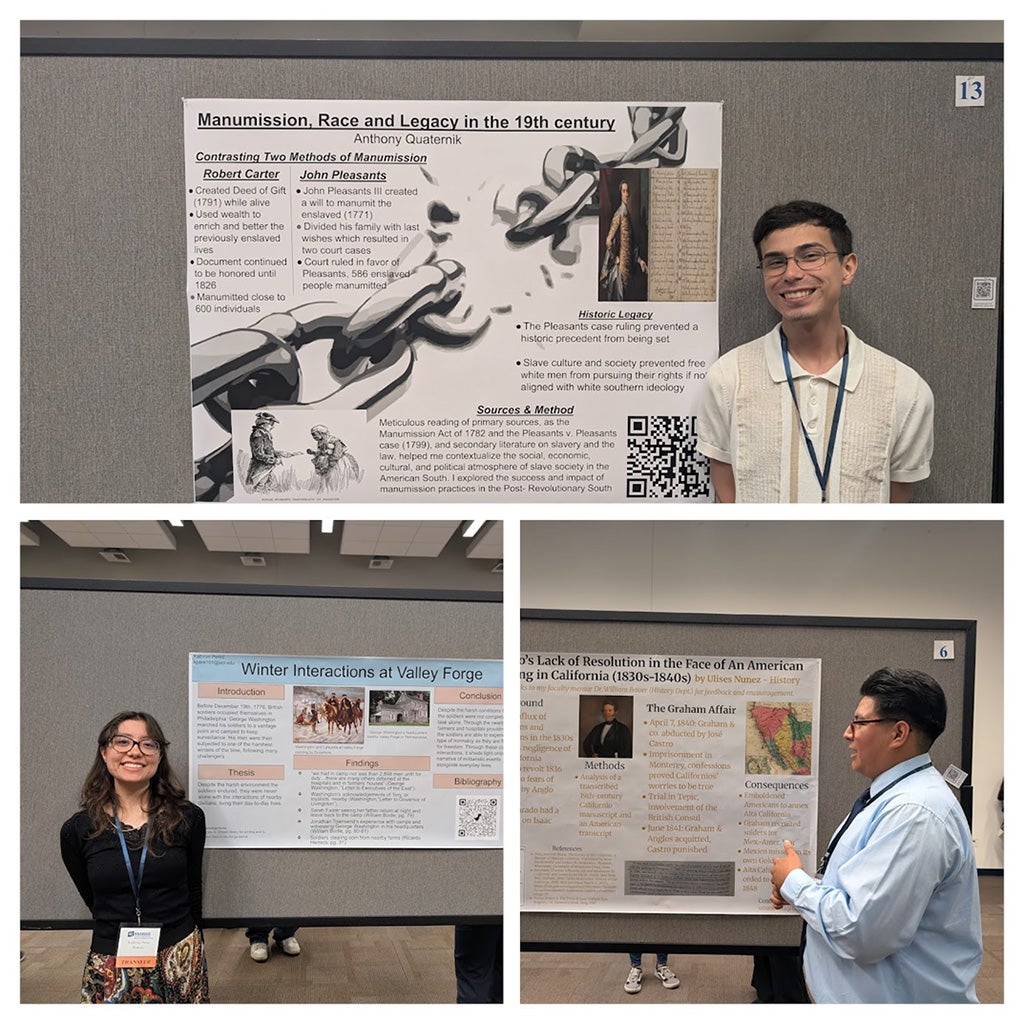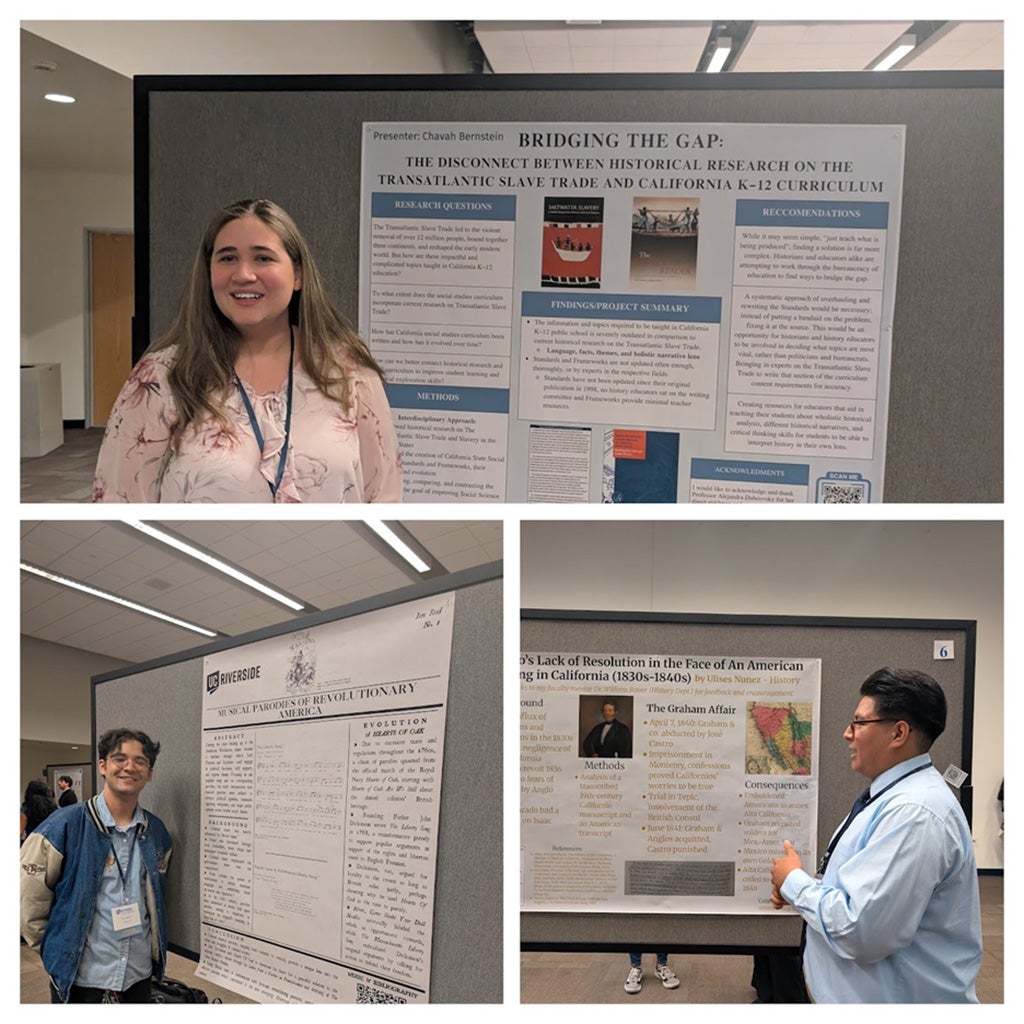
UCR history students are diving deep into diverse and compelling research, exploring everything from Native Hawaiian resistance and Soviet cultural diplomacy to Armenian survival narratives and Revolutionary War music parodies. These dynamic investigations were just some of the topics History students presented at the 2025 Undergraduate Research, Scholarship, and Creative Activity Symposium. The symposium, held April 22-25, 2025, provides an opportunity for undergraduate students from all disciplines to share their research and creative activities with the UCR community. History students once again demonstrated the breadth and depth of historical inquiry, presenting both emerging and completed scholarship across diverse time periods and geographical regions.
Students presenting their emerging and completed research through oral presentations tackled ambitious historical questions spanning continents and centuries. Connor Creach explored the complex dynamics of indigenous resistance with his presentation "Cultural Resistance and Survival: Native Hawaiian Adaptation to American Colonialism, 1898-1959," examining how Native Hawaiians navigated and resisted colonial pressures while maintaining cultural identity. Zachary Hanson, working with Professor Catherine Gudis, presented "Challenges, Hurdles, and Institutional Roadblocks in Undergraduate Documentary Filmmaking," bridging historical methodology with contemporary media creation. Nathan Ayala, under the guidance of Professor Kiril Tomoff, examined Cold War cultural politics with "Soviet Cultural Exchange in Mexico: An Early Cold War Perspective," revealing how cultural diplomacy shaped international relations.

The symposium featured powerful explorations of trauma, resistance, and memory. Anastasia Manvelyan, working with Professor Georg Michels, presented "Beyond Victimhood: The Resistance of Women and Children during the Armenian Genocide," centering agency and survival in genocide studies. Isabella Day, mentored by Professor Denver Graninger, offered fresh perspectives on classical literature with "Tragic Women Through the Lens of Greek Creation Myths." Sonia Chiappe, also working with Professor Georg Michels, examined war photography's evolution through "A Model of War Photography: The Legacy of Lee Miller."
Local Los Angeles history featured prominently in completed research projects. Steven Torres, guided by Professor Jorge Leal, investigated urban policy with "Trouble in East Los Angeles: Los Angeles' Model City Program, 1969-1973." He is now pursuing his PhD at UCSB! Amari Navarro, also working with Professor Leal, examined labor and race with "Segregated by Design: The Citrus Industry's Role in Maintaining a Racialized Labor Pipeline."
Ten history students presented their research through poster sessions. Several came from Dr. Dubcovsky's History of the American Revolution Course. Kathryn Perez investigated "Winter Interactions at Valley Forge," Ryan Corfman explored "The Fears of the Anti-Federalists," Anthony Quaternik examined "Manumission: limiting or freeing?", and Ian Reid delivered an amazing reading of song parodies to show the culture of change in the American Revolution with his work "Musical Parodies of Revolutionary America." Ulises Nuñez, working with Professor William Bauer, examined "Mexico's Lack of Resolution in the Face of an American Uprising in California (1830s-1840s)," and Damian Nuñez did a careful reading of 17th century sources in his poster "Cultural Resilience in Colonial American Captivity."

The poster sessions also featured innovative approaches to familiar topics. Murphy Hernandez presented "Reframing the Lavender Scare: Centering Queer Voices," bringing marginalized perspectives to Cold War history. Chavah (Gracie) Bernstein bridged historical research and education with "Bridging the Gap: The Disconnect Between Historical Research on the Transatlantic Slave Trade and California K-12 Curriculum." Holden Vigna, working with Professor Michele Salzman, examined "Sallust the Tragedian: the Memory of Sulla in Triumviral-Period Historical Narrative," demonstrating the continued relevance of ancient historical writing.
Whether presenting their research through oral presentations or poster sessions, these undergraduate historians exemplify the transformative power of historical inquiry. They excavated forgotten voices, challenged established narratives, and connected past and present. They worked with primary sources ranging from colonial manuscripts to Cold War diplomatic records. They asked bold questions about resistance, survival, and cultural memory. The scholarship of these students points toward a future generation of historians committed to inclusive, innovative, and socially conscious historical research.